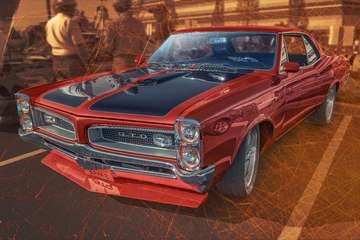Car wraps, an innovative solution for automobile aesthetics and protection, have revolutionized how we perceive vehicle customization. Best car wrap options? The choice of the right wrap not only enhances the car’s appearance but also plays a crucial role in its upkeep. This article delves into the world of car wraps, guiding you through various aspects to determine the best car wrap for your vehicle.

How Vehicle Wraps Have Changed Over Time
Car wraps, which first started as a way to advertise vehicles, have gone through many changes. Because of new technology, car wraps are not just for advertising anymore. They have become a way to make cars look better and keep them safe. The car wraps we have today are the result of many years of making them stronger, nicer, and safer.
Types of Car Wraps
Understanding the pros and cons of each type is crucial when determining the best car wrap options:
1. Full Wraps
- Description: A full wrap covers the entire surface of the vehicle. It’s ideal for a complete transformation for extensive branding purposes.
- Pros:
- Complete Coverage: Offers a brand-new look and comprehensive protection for the original paint.
- Customization: Allows for extensive design and color choices, providing a unique appearance.
- Resale Value: This can potentially increase the resale value by preserving the original paintwork.
- Cons:
- Cost: Generally more expensive due to the amount of material and labor involved.
- Time-Consuming: Installation is more intricate and time-consuming compared to other types.
2. Partial Wraps
- Description: Partial wraps cover only specific parts of the vehicle, such as the hood, roof, or doors.
- Pros:
- Cost-Effective: Less expensive than full wraps since they use less material.
- Versatility: Great for highlighting certain features of the vehicle or for subtle branding.
- Faster Installation: Generally quicker to apply than full wraps.
- Cons:
- Limited Protection: Only the wrapped parts are protected, leaving other areas exposed.
- Less Impactful: May not be as visually striking as a full wrap.
3. Vinyl Graphics
- Description: These are specific designs or logos applied to the vehicle’s surface. Ideal for business logos or small personal touches.
- Pros:
- Precision Branding: Perfect for precise branding or custom graphics.
- Flexibility: Easy to update or change.
- Lower Cost: Generally less expensive than full or partial wraps.
- Cons:
- Limited Coverage: Offers minimal protection as it covers only a small area.
- Design Constraints: Less room for creative design compared to full or partial wraps.
4. Matte Wraps
- Description: Matte wraps give a vehicle a flat, non-glossy finish. They are increasingly popular for their modern and sophisticated look.
- Pros:
- Unique Aesthetic: Provides a distinct, stylish appearance.
- Hides Imperfections: A matte finish can mask minor surface imperfections.
- Cons:
- Maintenance: Can be more challenging to maintain as they show dirt more easily and require specific cleaning products.
5. Glossy Wraps
- Description: Glossy wraps are similar to traditional paint and provide a high-gloss finish, making colors pop vividly.
- Pros:
- High Shine: Offers a vibrant, eye-catching appearance.
- Paint-Like Appearance: Resembles a high-quality paint job.
- Cons:
- Scratch Visibility: Scratches and imperfections can be more visible.
- Maintenance: Requires regular cleaning to maintain the shine.
Best Car Wrap Options:
Explore the key factors and considerations to identify the best car wrap options that suit your specific needs and style preferences.
- For Complete Transformation: A full wrap is ideal. It offers the most dramatic change and the highest level of protection.
- For Budget-Friendly Options: Partial wraps or vinyl graphics are great, especially if specific areas or designs are the focus.
- For Unique Finishes: Matte or glossy wraps are excellent choices. They cater to different aesthetic preferences, with matte being more understated and glossy offering more shine.
Benefits of Wrapping Your Car
Car wraps extend beyond aesthetic appeal; they are a protective layer against environmental elements. Compared to traditional paint jobs, car wraps are cost-effective and offer a reversible way to change your car’s look. The versatility in designs allows for personal expression and uniqueness.
Choosing the Right Wrap for Your Vehicle
Selecting the right car wrap involves understanding the diverse materials available and how they complement different car models and uses. Factors like climate, vehicle usage, and personal style preferences play a significant role in this decision.
Innovative Trends in Car Wrapping
The industry is witnessing a surge in innovative trends like smart wraps equipped with digital features and eco-friendly options. These advancements not only enhance the car’s appearance but also align with modern technological trends and environmental consciousness.
What Makes a Quality Car Wrap?
When considering the best car wrap options, the quality of the material is paramount. High-quality vinyl ensures durability and a flawless finish. It’s also crucial to consider the adhesive’s quality, which should offer a balance between strong adherence and ease of removal.
The Impact on Vehicle Resale Value
An often-overlooked aspect of car wrapping is its impact on the vehicle’s resale value. A high-quality car wrap can preserve the original paint, potentially increasing the car’s value. We’ll explore how car wraps can be a strategic choice for car owners looking to maintain their vehicle’s value.
What is the average cost of a car wrap?
The cost varies depending on the type and size of the wrap but generally ranges from $1,500 to $5,000. Full wraps are more expensive than partial wraps or vinyl graphics.
How long does a car wrap last?
A quality car wrap can last between 5 to 7 years, depending on the material used and maintenance.
Can a car wrap be removed without damaging the original paint?
Yes, high-quality wraps are designed to be removed without damaging the underlying paint, provided the paint was in good condition when the wrap was applied.
What is the best wrap for cars when considering durability?
High-quality vinyl wraps, particularly those with UV protection, are the best for durability, offering long-lasting color and protection.
Does a car wrap require special maintenance?
Car wraps require regular cleaning with mild soap and water. Avoid harsh chemicals and power washing to maintain the wrap’s integrity.
Can I wrap a leased car?
Yes, you can wrap a leased car, as wraps are removable. However, it’s advisable to check with your leasing company first.
What are the benefits of wrapping a car instead of painting it?
Wrapping is more cost-effective, offers more design options, and is less permanent than painting, making it ideal for temporary or seasonal changes.
What is the best wrap for cars in terms of custom design options?
Vinyl wraps offer the best in custom design options, allowing for a wide range of colors, patterns, and even textures.
Is it possible to repair a damaged section of a wrap?
Yes, it’s possible to repair sections of a wrap. However, the success depends on the extent of the damage and the wrap’s age and condition.
How does the weather affect car wraps?
Extreme weather conditions like intense sun or cold can affect the lifespan of a wrap. Quality wraps come with UV protection to mitigate sun damage, but regular maintenance is key in harsh weather conditions.
Conclusion:
Each type of car wrap has its unique advantages and limitations when it comes to the best car wrap options. The best choice depends on what you value most: complete transformation, cost-effectiveness, specific designs, or a particular finish. By weighing these pros and cons against your personal or business needs, you can select a car wrap that not only enhances your vehicle’s appearance but also meets your practical requirements. For more information on car wraps, don’t hesitate to visit Wrap Your Cars.
